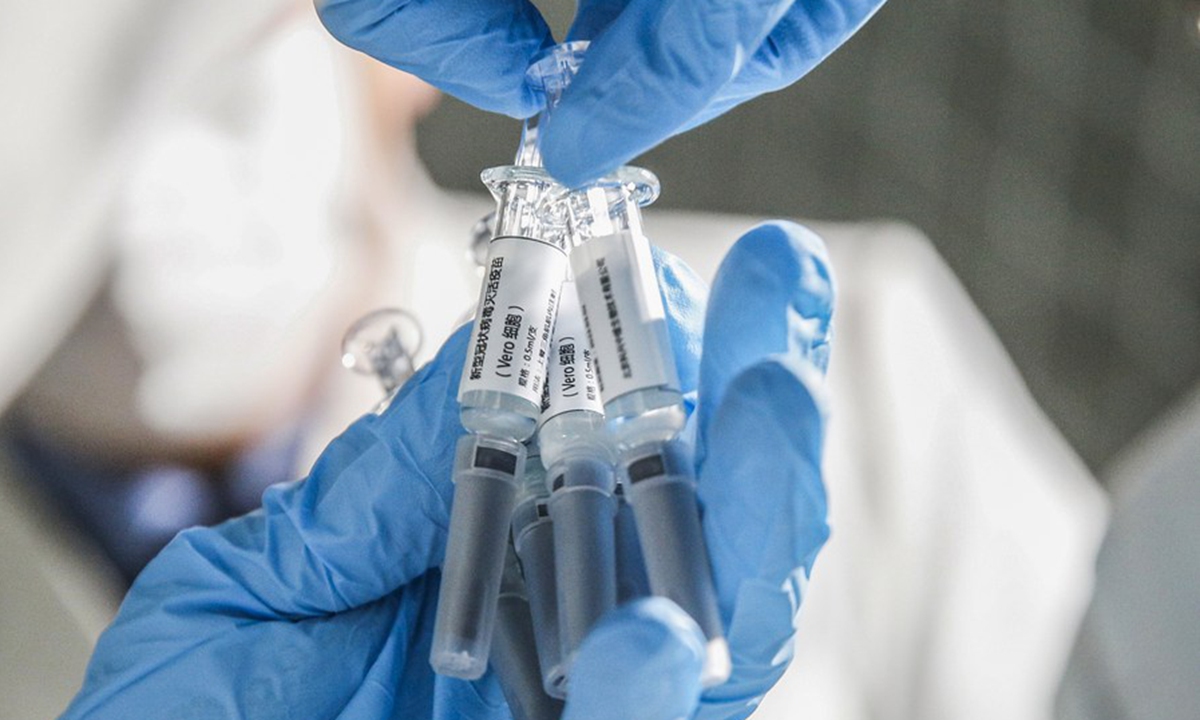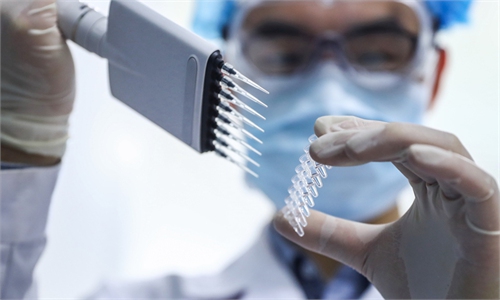Multiple methods ensure higher success rate of COVID-19 vaccines in China as clinical trials suspended in US: experts

A staff member displays samples of the COVID-19 inactivated vaccine at Sinovac Biotech Ltd., in Beijing, capital of China, March 16, 2020. Photo: Xinhua
The suspension of Johnson & Johnson's clinical trials on a COVID-19 vaccine and Eli Lilly's clinical trials on a COVID-19 drug in the US on two consecutive days raised safety concerns over COVID-19 vaccines and drugs in China, especially as the method Johnson & Johnson used is the same applied in a vaccine co-developed by CanSino and Chinese military medical expert Chen Wei.
In response, some Chinese experts have tried to ease public concerns, highlighting China's multiple methods and focus on traditional and mature techniques to ensure speed as well as safety.
Tao Lina, a Shanghai-based immunology expert, noted that so far, there is no evidence to show that the problems leading to the suspension were caused by the experimental products.
It is actually not uncommon to see health issues in volunteers during clinical trials, and in most cases it is merely a coincidence, Tao told the Global Times on Wednesday.
"I even suspect it could be a trick by Trump's opponents to shatter his dream of using (COVID-19) vaccines and drugs to win votes," Tao joked.
US President Donald Trump in September asserted that a coronavirus vaccine could be ready by the end of October - weeks before the November 3 presidential election, according to CNBC.
Wang Ying, a Shanghai-based immunologist, told the Global Times that the pandemic in foreign countries and regions could also interrupt their clinical trials as volunteers may get infected with COVID-19 after vaccination, which would worsen basic illnesses or lead to unknown diseases.
"As the epidemic in China has been brought under control, such uncertainty could be ruled out," Wang said.
Eli Lilly announced the suspension on Tuesday, citing a "potential safety concern."
The news came one day after Johnson & Johnson announced a suspension of its vaccine clinical trials due to the illness of a volunteer and about one month after AstraZeneca halted clinical trials of a vaccine it co-developed with Oxford University when two volunteers fell ill after receiving vaccines.
Meanwhile, the Oxford/AstraZeneca vaccine clinical trials resumed on September 14 in Brazil after a safety assessment.
The vaccines developed by Johnson & Johnson and Oxford/AstraZeneca used the same method co-developed by Chinese vaccine developer CanSino Biologics Inc CanSino and a team led by the Chinese military medical expert Chen Wei, which is a recombinant adenovirus vaccine.
However, the two former vaccines use chimpanzee-derived adenovirus as vectors while the latter uses human adenovirus.
Tao said that no evidence was found to prove that human adenovirus is safer than chimpanzee adenovirus in vaccines, but it is true that multiple methods carried out simultaneously in China would help ensure a higher success rate.
To ensure the success of vaccines, China has been taking five technical routes to find vaccines against the disease - inactivated vaccines, adenoviral vector-based vaccines, live attenuated influenza vaccines, DNA and mRNA vaccines. So far, four of them have entered clinical trials: three inactivated vaccines and one recombinant vaccine.


